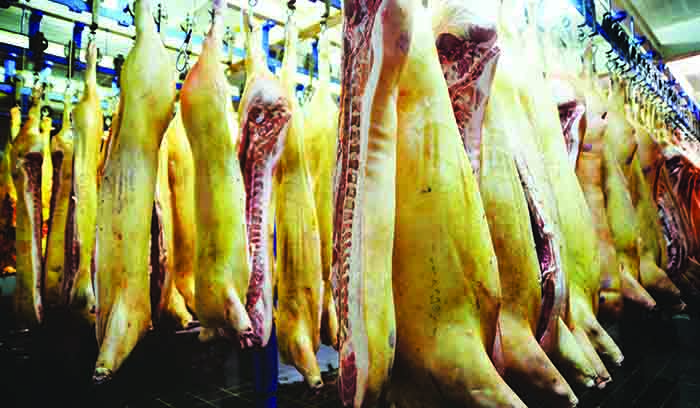Pig farmers across the country have been expressing concerns at a lack of demand for Red Tractor pigs. Are cheap imports to blame? Alistair Driver reports
It is the last thing any pig farmer wants in the run-up to Christmas. Weak demand for surplus Red Tractor pigs is creating backlogs on farms, causing financial and practical headaches for producers.
So why is this happening? And is it a blip or something more profound?
While industry experts disagree on the precise causes, the availability of significantly cheaper imports and a big move towards sourcing Freedom Food/RSPCA Assured pigs by retailers both appear to be playing a part.
Chris Fox, Thames Valley Cambac’s northern livestock manager, said the current market situation was ‘somewhat of a new experience for us all’. “There has been unprecedented demand for Freedom Food pigs in the run in to Christmas, and demand has seemingly outstripped supply,” he said, highlighting the Co-op’s move to 100% outdoor-bred pork this year as an example of the trend. But average weights of Freedom Food slaughter pigs are starting to tumble, he added.
He added that indications from outdoor producers suggested poor production, initially with PRRS issues at the start of the year, followed by ‘The Beast from the East’ in March, and then the extreme summer heat.
“The question is now whether there are enough Freedom Food pigs to match demand going forward, or will we see retailers switching lines back to Red Tractor? This forward pull will only shorten the availability of Freedom Food pigs in January 2019, which will hopefully give an option for extra Red Tractor kill post-Christmas,” he said.
Mr Fox said he did not believe imports were a big factor, despite extra supplies from Belgium on the back of cheaper prices caused by the African swine fever (ASF) outbreak.
AHDB’s Bethan Wilkins said slaughter has been lower than expected in recent weeks, with estimated GB weekly slaughterings averaging below year earlier levels since October. Carcase weights have also risen rapidly, indicating pigs are being marketed later.
There were some signs throughputs were starting to pick up in November, but levels were still below a year earlier. Throughputs will need to pick up significantly in the next few weeks if AHDB’s forecast 4% year-on-year rise in slaughterings in Q4 is to materialise. “If this doesn’t happen, there could be an overhang into January,” Ms Wilkins said.
She agreed that greater demand for RSPCA Assured pork was a factor, but also highlighted the role of imports.
“The evidence points more to competition with lower priced imports than lack of demand,” she said. “Demand at a retail level seems to be reasonable – the latest 12-week period (to November 4) indicates that volume sales of pig meat have increased over 1% year-on-year, although this doesn’t include demand from the foodservice sector, which may be different.”
UK prices have fallen steadily during the autumn, although the SPP was stable at around 143p/ kg in late November.
But EU prices have dropped much more sharply due to insufficient consumer demand and disruption caused by ASF in Belgium. As a result, the gap between the UK and EU average pig reference prices widened to 25p/kg in mid-November, significantly above the average of 18p/kg, Ms Wilkins said.
“This picture fits with reportedly better demand for RSPCA Assured pigs over Red Tractor, which can be less easily substituted with imported product than ‘premium pigs’,” she said.
The knock-on effect of all this, according to valuer and well- known industry commentator Peter Crichton is that it is getting harder to sell surplus pigs at a traditionally busy time.
“Contract spaces remain tight and although now is the time for buyers to start putting forward extra numbers to cover the Christmas/New Year shut down, there seems to be very little appetite for extra pigs at present, which could lead to a significant backlog building up over the festive period and beyond,” he said.
NPA chairman Richard Lister added: “There just seems to be an extremely slack demand out there. I think it’s a short- term blip. We have got a very difficult trading environment, which probably wasn’t helped by a short-term glut of Belgian product on the market. Hopefully, things will correct as we move towards the spring and there’s a thinning in pig numbers.
“It can be uncomfortable when pig numbers build up on farms, so we would urge anyone who might be affected to plan accordingly. As the spotlight shines on the industry, it is vital that high standards are maintained at all times.




